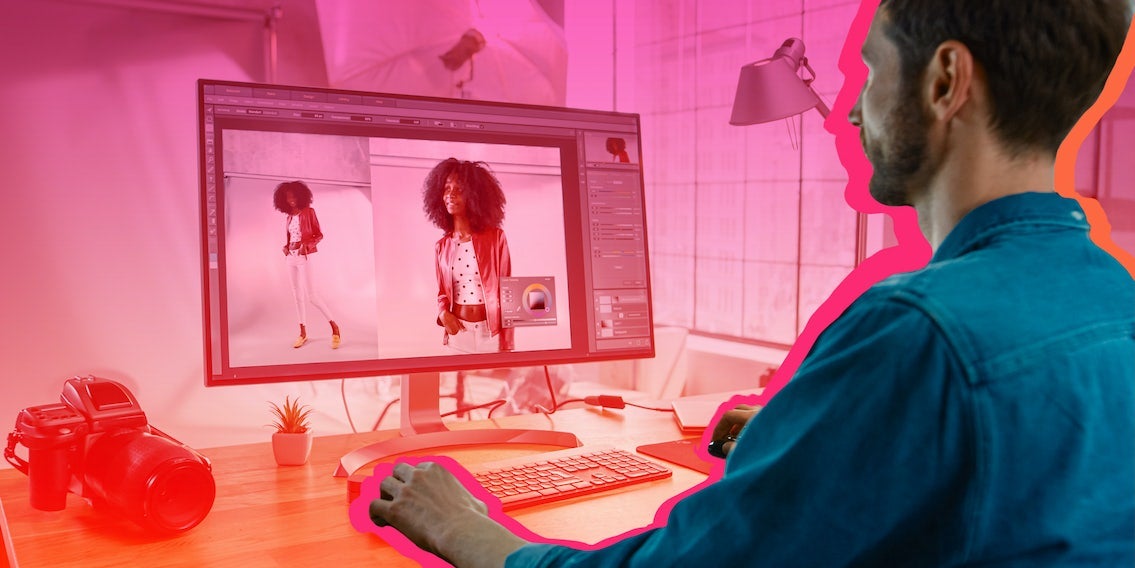
The modeling industry might be notorious for its narrow vision of beauty, but now that we’re in 2023, you might think that brands have become a little more forward-thinking regarding body positivity and over-editing photos. Unfortunately, as one model and content creator discovered, not all brands are willing to jump on the “no filter” train just yet.
Mahala Preudhomme (@hala_thehustler) is a plus-size model, content creator, influencer, artist, and small business owner who has worked with a number of fashion and lingerie brands like Amazon Fashion, Savage X Fenty, Shein, Able, and Stitch Fix among others. She has over 67,900 cumulative followers across Twitter, Instagram, and TikTok.
Following a shoot with an undisclosed brand, she took to Twitter to share the difference between an edited and un-edited photo of her, writing, “How I really look vs what the brand uploaded.”
The tweet, which 4.1 million people viewed as of January 2023, shows two starkly different pictures of Preudhomme: the original photo, where she has a more natural look, and another where heavy makeup appears to have been edited onto her face by the brand, as well as changing her eye color and appearing to change the shape of her face.
Providing further context to the tweet posted December 30, Preudhomme wrote, “For the record I loved working for this brand and have nothing I’ll to speak, but it’s 2022. … damn near 2023, this is unacceptable.”
Users shared their shock at the brand’s airbrushing, with one user branding it “disrespectful” and saying, “You looked STUNNING how you were. Like what was the issue?” Another remarked how the brand gave the model “a whole new face.” Multiple creators debated the practice in the Twitter thread, with Twitter influencer Kelly Ellis replying, “Gave you a whole new face when the more natural look is 1000x better.”
In response to one of her supporters, Preudhomme described the brand’s editing as “alarming,” and added that “it also saddens me because they could’ve had the makeup artist do makeup in that style, but whatever.” Passionfruit reached out to a representative for Preudhomme via email and did not hear back in time for the publication of this article.
Models and influencers are typically required to sign image releases as a part of brand negotiation, which often gives brands full legal rights to edit and share a photo however they wish. Creators have spoken out against the practice in viral posts. In one 2021 TikTok video with over 5.8 million views, one model said she “didn’t even recognize herself” after a brand edited her photos.
With the rise of retouching apps like Photoshop and Facetune, photo editing of bodies and faces has been a subject of heavy debate for creators, due to the practice negatively impacting social media users’ body image and self-perception—especially for young people. According to a 2021 study from ParentsTogether, 61% of teens reported lower self-esteem and poor body image due to using beauty filters online.
Many creators have spoken out in favor of body positivity, self-love, and only posting unfiltered photographs online. Some creators also advocate for working with brands like Dove, Olay, Aerie, and Target, which don’t retouch models’ photographs.
Still, toxic trends like body checks have been a subject of controversy on apps like TikTok. Meanwhile, Facebook, Instagram, and TikTok have all been criticized for allegations that eating disorder content was purposefully promoted to children through targeted algorithms.
Some creators have even called for laws mandating public disclosure of photo editing in social media posts and advertisements. In 2017, a law in France mandated that airbrushed and Photoshopped images of models from brands must include a disclosure of editing. In response to the French law, stock library service Getty Images announced it would no longer allow photos of edited models on its platform.
As of 2021, Norway also passed a law requiring influencers to publicly disclose whether or not a photo was edited to enhance lips, exaggerate muscles, narrow waists, and more. Many influencers spoke out in favor of the law. In April 2022, a similar bill was passed in the United Kingdom.




